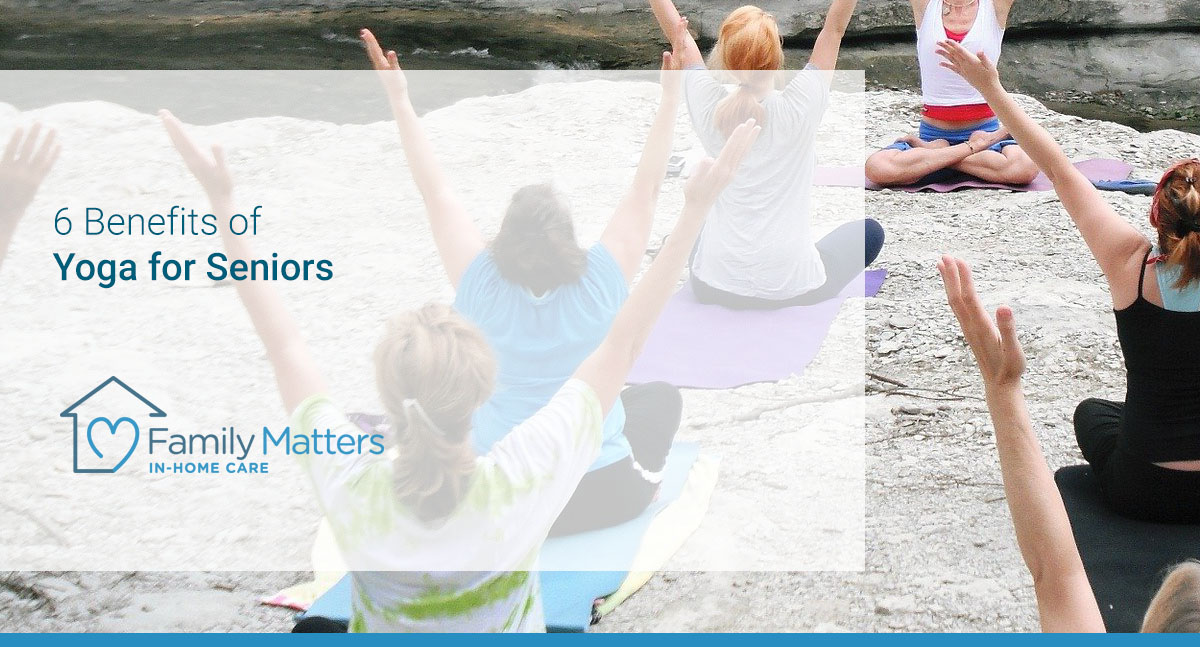
6 Benefits of Yoga for Seniors
Yoga is a great form of exercise for seniors. Many yoga postures can increase flexibility, mobility, strength, and balance through low-impact movement. Psychologically, it can help keep your mind sharp and increase positive emotions, mindfulness, and self-awareness.
The Benefits of Yoga for Seniors
It is tempting to look at some of the extreme yoga poses depicted in movies and think that it is not an activity for our older adults.
However, a good yoga instructor will find poses that work for any of their students.
The benefits are not derived from hitting a specifically difficult pose but in moving one’s body mindfully toward that pose within your own individual limits.
A yoga class taught by an instructor that is aware of the challenges and limitations of an older student can yield many benefits, including:
- Balance. Falls are one of the most common causes of injury in older adults. Balance poses can give their bodies more “tools” to stay steady.
- Stress Relief. The calm mindfulness of yoga can center your loved one’s thoughts and even provide moments of clarity.
- Mobility. Working slowly through ranges of motion can increase overall mobility, in turn increasing independence and self-confidence.
- Strength. Slow, controlled movement forces the muscles to work harder, thus building strength as they work through the postures.
- Flexibility. Many of the poses focus on working through a range of motion. Increased flexibility and muscle tone can help protect your loved one from accidents.
- Bone Density. A recent study showed a connection between yoga and increased bone density in seniors who have osteoporosis or osteopenia. Increased bone density leads to fewer fractures than seniors who don’t practice any muscle-improving exercises.
Yoga works on a healing premise that brings the mind, body and breath together to perform various poses.
For example, as a mood booster, poses that open the chest and pull shoulders back, such as the Bridge or Modified Bridge poses, counteract the fact that, when stressed or anxious, we tend to round our shoulders and cave inward.
Body language experts have determined that even moving into a posture that conveys strength, power, and confidence will inspire that feeling within ourselves.
Yoga is Adaptable for Seniors
About half of Americans over the age of 65 have a disability related to hearing, vision, or walking. More than 87% of seniors take at least one prescription drug and nearly 60% take 3 or more.
All of these can affect balance and the ability to understand or work through complex steps. It is important to find a yoga instructor who is familiar with some of the challenges of older adults.
A certified yoga instructor should be familiar with adaptations to the traditional poses and attentive enough to step in to guide your loved one through these adaptations. Classes that are set up with a competitive feel may not be appropriate for someone who needs the extra attention.
Yoga can be adapted even to students who are chair-bound, with a variety of spine and hip strengthening exercises taking place in a seated position. As your loved one gains strength, the chair can become a stabilizing prop for leg and ankle poses as well.
Types of Yoga
When looking for a class or instructor, there are many types of yoga to be aware of:
- Ashtanga, Vinyasa, or Power Yoga tends to be fast paced and requires a lot of poses where the hands bear weight.
- Kundalini classes are often primarily done in a seated position and work with breath and chanting.
- Hatha, Lyengar, or classes that are alignment focused tend to be slower and allow for a greater number of adaptations.
- Yin, Restorative, and Chair yoga tend to be floor- or chair-based to help with adaptations.
Try to find an instructor who is open to meeting with you and your loved one ahead of time to take note of physical challenges, including past injuries, so that they can best help them through the poses.
Avoid instructors who believe that every pose is accessible to every person. The ultimate achievement of a particular pose should not be the goal of a yoga practice.
When is Yoga Not Recommended for Seniors?
While yoga is a highly adaptable practice, some conditions can make it riskier:
- Unregulated blood pressure
- Advanced Parkinson’s Disease
- Advanced Alzheimer’s Disease
- Spinal degeneration
- Medications that cause dizziness
Consult with your senior’s physician to determine if yoga is an appropriate activity. Sometimes, if it is something your loved one has their heart set on, it can still be accomplished in a one-on-one class with an instructor who is familiar with their health challenges.
If you or your family member is considering in-home care as part of a plan to age in place, contact Family Matters In-Home Care today for a free consultation. Our team is dedicated to supporting your family and helping older adults enjoy life in the comfort of their own home for as long as possible.
Some of the services offered by Family Matter In-Home Care include: Alzheimer’s & Dementia Care, Bed & Wheelchair Transfer Assistance, Companionship, Housekeeping & Meal Preparation, Personal Care, Recovery Care, and Transportation.
Serving the San Francisco Bay Area and Greater San Diego, Family Matter In-Home Care has offices throughout California including: Campbell, CA, Roseville, CA, San Marcos, CA, and San Mateo, CA.
Sources:
- https://f.hubspotusercontent30.net/hubfs/1708580/Marketing%20Monthlies/PDFs/0321-Yoga.pdf
- https://chopra.com/articles/5-beginner-yoga-poses-for-seniors
- https://yogainternational.com/article/view/yoga-over-50
- https://www.lifeline.philips.com/resources/blog/2015/06/yoga-for-Seniors.html
- https://dukeintegrativemedicine.org/DHWBlog/some-commonly-taught-yoga-poses-may-present-risks-for-older-adults/
